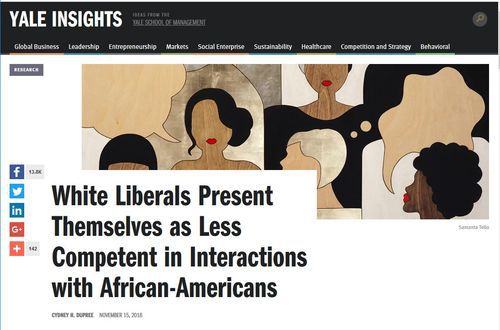


11/24/2018
From the Yale U. PR office:
White Liberals Present Themselves as Less Competent in Interactions with African-Americans
CYDNEY H. DUPREE NOVEMBER 15, 2018
A new study suggests that white Americans who hold liberal socio-political views use language that makes them appear less competent in an effort to get along with racial minorities.
… According to new research by Cydney Dupree, assistant professor of organizational behavior at Yale SOM, white liberals tend to downplay their own verbal competence in exchanges with racial minorities, compared to how other white Americans act in such exchanges. The study is scheduled for publication in the Journal of Personality and Social Psychology.
While many previous studies have examined how people who hold racial bias behave in multi-racial settings, few have studied how whites who are more well-intentioned interact with people of other races. “There’s less work that explores how well-intentioned whites try to get along with racial minorities,” Dupree says. “We wanted to know their strategies for increasing connections between members of different social groups — and how effective these strategies are.”
Read the study: “Self-Presentation in Interracial Settings: The Competence Downshift by White Liberals”
Dupree and her co-author, Susan Fiske of Princeton University, began by analyzing the words used in campaign speeches delivered by Democratic and Republican presidential candidates to different audiences over the years. They scanned 74 speeches delivered by white candidates over a 25-year period. Approximately half were addressed to mostly-minority audiences — at a Hispanic small business roundtable discussion or a black church, for example. They then paired each speech delivered to a mostly-minority audience with a comparable speech delivered at a mostly-white audience — at a mostly-white church or university, for example. The researchers analyzed the text of these speeches for two measures: words related to competence (that is, words about ability or status, such as “assertive” or “competitive”) and words related to warmth (that is, words about friendliness, such as “supportive” and “compassionate”). …
The team found that Democratic candidates used fewer competence-related words in speeches delivered to mostly minority audiences than they did in speeches delivered to mostly white audiences. The difference wasn’t statistically significant in speeches by Republican candidates, though “it was harder to find speeches from Republicans delivered to minority audiences,” Dupree notes. There was no difference in Democrats’ or Republicans’ usage of words related to warmth. “It was really surprising to see that for nearly three decades, Democratic presidential candidates have been engaging in this predicted behavior.”
With this preliminary evidence in hand, the researchers set out to further test their ideas.
… The word “sad,” for example, scored low for both warmth and competence. “Melancholy,” on the other hand, scored high for competence and low on warmth.
Participant also completed a variety of measures that assessed how liberal they were.
The researchers found that liberal individuals were less likely to use words that would make them appear highly competent when the person they were addressing was presumed to be black rather than white. No significant differences were seen in the word selection of conservatives based on the presumed race of their partner. “It was kind of an unpleasant surprise to see this subtle but persistent effect,” Dupree says. “Even if it’s ultimately well-intentioned, it could be seen as patronizing.”
Dupree and Fiske suspect that the behavior stems from a liberal person’s desire to connect with other races. One possible reason for the “competence downshift,” as the authors describe it, is that, regardless of race, people tend to downplay their competence when they want to appear likeable and friendly. But it’s also possible that “this is happening because people are using common stereotypes in an effort to get along,” Dupree says.